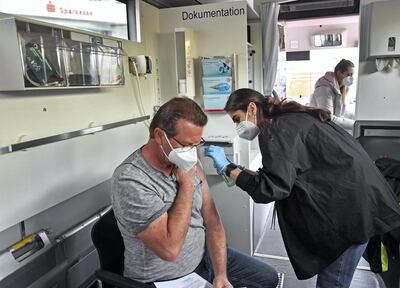Germany’s plan to relax Covid-19 restrictions for vaccinated people has been met with anger among young people who say the policy is discriminatory.
Under the proposals, approved on Monday by Chancellor Angela Merkel’s coronavirus cabinet, people inoculated against Covid-19 or who have recovered from the disease would no longer have to abide by the night-time curfew or limitations on social gatherings.
Justice Minister Christine Lambrecht said she hoped the bill would be passed by the German Parliament this week.
There is a deepening frustration in Germany against tough restrictions, now in their sixth month of operation, and that the proposed scheme could create a two-tier society.
Concern that citizens may have to put up with prolonged restrictions became stronger last month when the German government passed a new law granting it sweeping powers to impose lockdowns in areas with high Covid-19 infection rates.
The slow pace of vaccination was another source of public criticism, although the campaign is gathering speed.
Germany set a European record last week when more than one million people were vaccinated in 24 hours. More than 23 million Germans have received at least one dose of a vaccine, while 6.6 million are fully inoculated with two.
About 22 per cent of adults in Germany have received a Covid-19 vaccine, Our World In Data said, compared to 62 per cent in Israel, 51 per cent in the UK and 44 per cent in the US.
Older people, those with chronic health conditions and frontline workers were vaccine priorities under Germany’s staggered distribution system.
Tilman Kuban, head of the Christian Democrats’ youth wing, the Young Union, said it was unfair to relax restrictions for vaccinated older people when most young people have not been offered a shot.
"We shouldn't be sending a signal that a certain part of society is allowed to travel again and live normally while others have to stick it out for months to come," he told Die Welt newspaper.
Daniel Gunther, a senior Christian Democrat MP, was another to criticise the government’s plan.
"You have to take into account that a very significant part of the population has not yet had a chance to get vaccinated," he said.
Doctors said it was dangerous if vaccinated people did not have to submit to compulsory Covid-19 tests.

"Vaccinated people absolutely have to continue to be tested. It would be fatal if vaccinated people and people who've recovered were exempt from all test obligations, for example when entering the country," Federal Association of Doctors spokesman Ute Teichert told Funke media group.
“Without comprehensive tests, we lose track of what is happening with the infection, especially with regard to virus variants.”
But Health Minister Jens Spahn defended the proposal, and said vaccinated people barely spread the virus at all.
“Fully vaccinated people have a significantly reduced risk of infection,” he tweeted.
German government spokesman Steffen Seibert said the new law was not about granting privilege to vaccinated people, but “giving them relief and waivers … from certain restrictions, as is due to them under their constitutional rights”.
Meanwhile, the European medicines regulator announced it would review the Chinese-made Sinovac vaccine for effectiveness and safety.
The review is the first step toward potential approval in the bloc.
The European Medicines Agency said its decision to start the review was based on preliminary results from laboratory and clinical studies that “suggest the vaccine triggers the production of antibodies” and “may help protect against the disease”.
The agency is conducting rolling reviews of three other vaccines: one developed by German biotech company CureVac, the American-developed Novavax and Russia’s Sputnik V.
Germany said it would be open to distributing vaccines developed outside the West if they were approved by the regulator.









